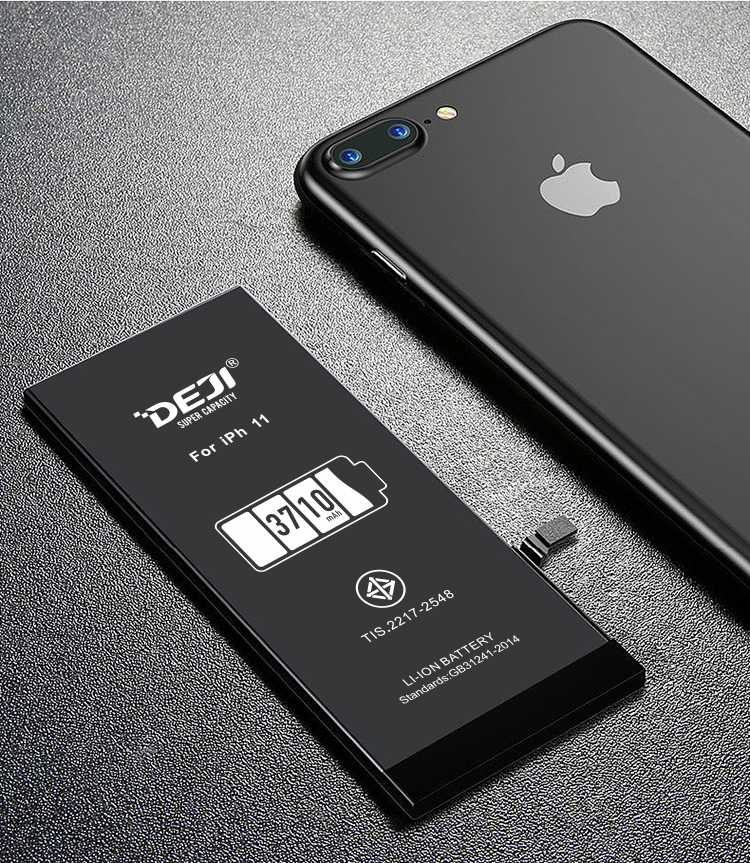
Cell phone batteries are the lifeblood of our devices, ensuring we stay connected and productive throughout the day. However, as with any component, batteries degrade over time and eventually need to be replaced. But how do you know when it's time for a replacement, and how can you ensure you’re choosing the right battery? This article explores the key aspects of cell phone batteries, from types and replacement safety to choosing and assessing quality, ending with the advantages of DEJI cell phone batteries.
Types of Cell Phone Batteries
Cell phones today predominantly use two types of batteries, each with unique characteristics:
-
Lithium-Ion (Li-ion) Batteries:
- Most modern smartphones are powered by lithium-ion batteries due to their high energy density, lightweight design, and rechargeability.
- They are durable and efficient but gradually lose capacity over time due to repeated charging cycles.
-
Lithium-Polymer (Li-Po) Batteries:
- These batteries are slimmer and more flexible in design, making them suitable for ultra-thin devices.
- While they are less prone to leaking and offer comparable performance to Li-ion batteries, they also degrade over time.
Understanding the type of battery in your device is essential, as it informs your approach to maintenance and replacement.
Is It Dangerous to Replace Cell Phone Batteries?
Replacing cell phone batteries can be safe when done correctly but poses risks if mishandled.
-
Potential Dangers:
- Swelling or Punctures: Damaged batteries may swell or rupture, potentially leading to leaks, overheating, or even fires.
- Electrostatic Discharge (ESD): Mishandling internal components during replacement can damage sensitive electronics.
- Incorrect Installation: Poor connections or using incompatible batteries can compromise device functionality.
-
Professional Assistance:
- For safety, it’s recommended to have batteries replaced by professionals or authorized service centers unless you’re experienced in handling electronic repairs.
Why Is It Necessary to Replace Cell Phone Batteries?
Several signs indicate the need for a battery replacement:
- Decreased Battery Life: A significant reduction in how long your phone lasts on a single charge is a key sign.
- Slow Charging: If charging takes considerably longer than before, the battery may be deteriorating.
- Swelling or Deformation: A swollen battery poses a safety risk and should be replaced immediately.
- Unexpected Shutdowns: Phones shutting off despite showing sufficient charge indicate a failing battery.
- Overheating: Excessive heat during use or charging often signals battery issues.
Replacing a degraded battery not only improves performance but also prevents potential hazards.
How to Choose Cell Phone Batteries
Selecting the right replacement battery involves careful consideration of compatibility, quality, and brand reputation:
- Check Compatibility: Ensure the battery matches your device’s make and model. Incorrect batteries can damage your phone.
- Opt for Certified Products: Look for batteries with certifications like CE, FCC, or RoHS, which ensure safety and compliance with regulations.
- Consider Capacity: Higher-capacity batteries may offer longer usage times, but ensure they fit your device.
- Read Reviews: Customer feedback can provide insights into the reliability and performance of replacement batteries.
- Brand Matters: Choose batteries from reputable manufacturers with proven track records of quality and durability.
How to Judge the Quality of Cell Phone Batteries
The quality of a cell phone battery is critical for performance and safety. Here are factors to assess:
- Physical Condition: A new battery should be free from scratches, swelling, or deformities.
- Battery Life: High-quality batteries should provide near-original performance levels in terms of daily usage and charging cycles.
- Consistency: Good batteries deliver stable performance without abrupt drops in charge.
- Certification: Trusted batteries will have certifications for quality, safety, and environmental standards.
- Warranty: A warranty reflects confidence in the battery's durability and performance.
- Testing Tools: Voltage, capacity, and internal resistance can be tested with appropriate tools to verify battery health.
Advantages of DEJI Cell Phone Batteries
DEJI has established itself as a leading name in the cell phone battery market, offering reliable and high-performance replacement batteries. Here’s why DEJI stands out:
- Wide Compatibility: DEJI batteries are designed to fit a broad range of smartphone brands and models, ensuring an easy replacement process.
- Superior Quality: Manufactured with advanced technology, DEJI batteries offer consistent performance, long life, and safety.
- Enhanced Capacity Options: Many DEJI batteries provide higher capacities than OEM batteries, extending phone usage times.
- Certified Safety Standards: DEJI batteries comply with international safety certifications, ensuring they are safe to use and environmentally friendly.
- Affordable Prices: DEJI offers premium-quality batteries at competitive prices, making them an excellent value for customers.
- Comprehensive Support: With a strong warranty and responsive customer service, DEJI ensures peace of mind for buyers.
Conclusion
Replacing your cell phone battery when it starts showing signs of deterioration can significantly enhance your device’s performance and extend its lifespan. By understanding the types of batteries, recognizing when a replacement is needed, and choosing a high-quality product like DEJI, you can ensure a seamless and safe replacement experience. Whether you’re a tech-savvy individual or prefer professional assistance, knowing what to look for and prioritize helps you make an informed decision.
 sales@batterydeji.com
sales@batterydeji.com




